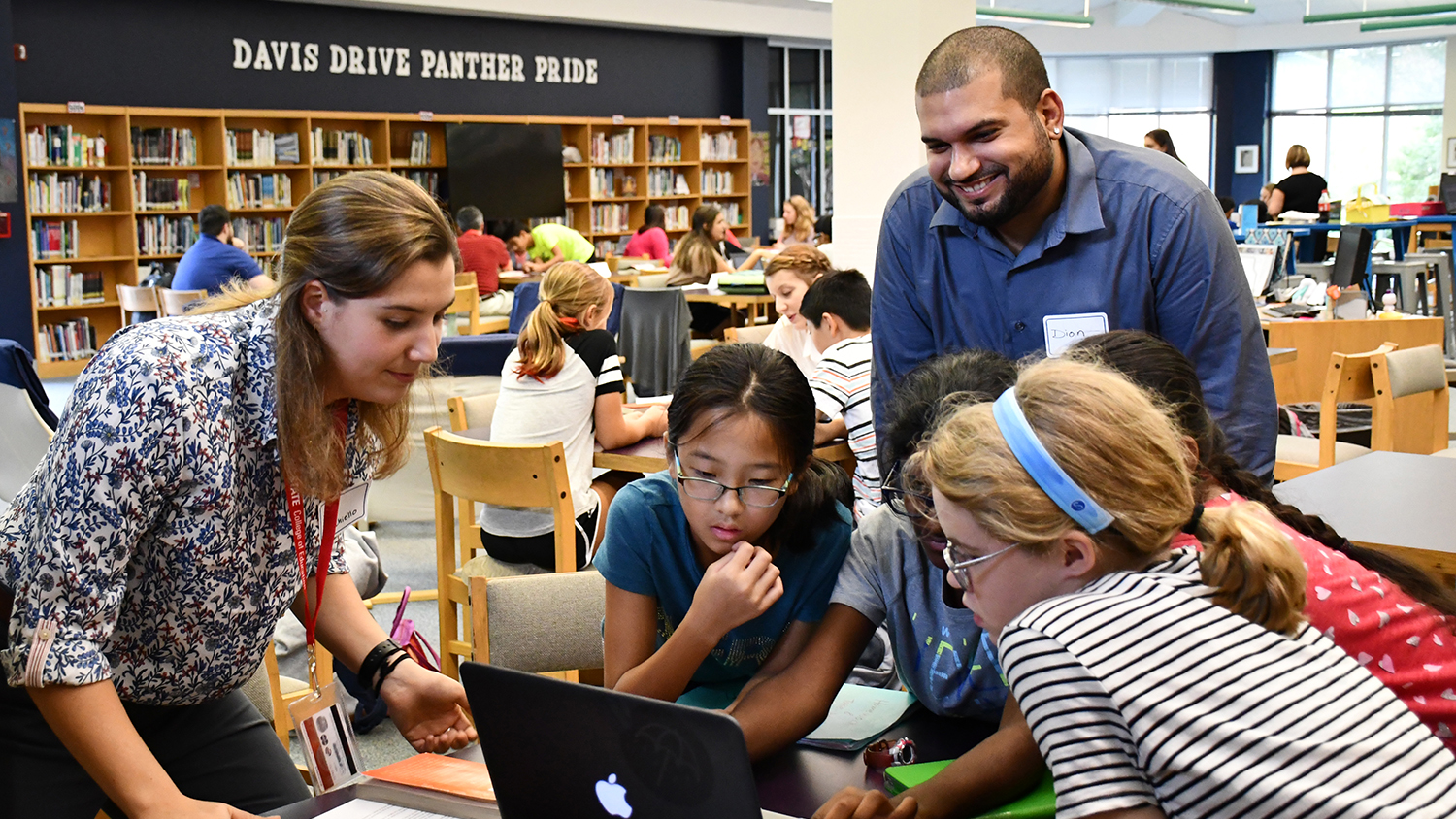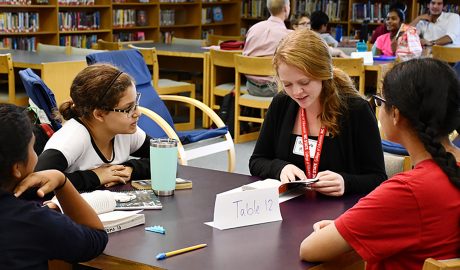Lighting a Fire for Diversity and Young Adult Literature through Project LIT

Dion Figueroa says he wasn’t exposed to a story with characters that looked like him until college. That lack of representation in required reading throughout his elementary and secondary education left him feeling lost in his identity and unsure of his next steps after high school. Now the NC State College of Education senior and middle grades education major has the opportunity to help other students at Davis Drive Middle School in Wake County see themselves and imagine their future.
Figueroa helps middle schoolers develop their literacy through young adult books that feature diverse characters through Project LIT, a grassroots literacy movement he got involved with in Assistant Professor Michelle Falter’s Young Adult Literature class he’s taking this semester. Project LIT provides culturally diverse, age-appropriate books to students in all grades to empower them with stories related to their lives and experiences.
Sixth-grade language arts teacher Carissa Metoyer discovered the movement on Twitter last June and immediately applied to be a school leader to bring the program to Davis Drive Middle.
“As I was teaching the new curriculum last year, I felt like I wasn’t reaching every student in my sixth-grade language arts class,” she said. “We didn’t have the diversity in our material that the other grades have, and I felt like we were failing so many of our students.”

Once she became a Project LIT school leader, she partnered with Davis Drive Middle School Principal Rick Williams and Media Specialist Carmen Brennan ’97, a former Teaching Fellow at NC State, to implement the program at the start of the new school year.
Metoyer then approached the NC State College of Education looking for professors who might be interested in using the club as an outreach activity for their classes and found Falter’s Young Adult Literature class.
“I think it’s really important for our pre-service teachers to have opportunities to work with kids as many times as possible, even if it’s within their own [college] classes,” Falter said. “So when Carissa reached out to me with the idea to partner on Project LIT, we discovered we had similar philosophies about the kinds of literature that should be in students’ hands. It felt like the stars were aligning in a way.”
The proposed meeting date for the book club was Wednesday — the day Falter’s Young Adult Literature class typically meets. Now, once a month, Falter’s class meets at Davis Drive Middle School and spends their scheduled class time reading book discussions and group activities for Project LIT.
“What’s great about this partnership is that I have 15 students in my class who are in their final semester before they begin student teaching,” Falter said. “My students can put into practice what they have learned about creating good discussion around literature, how to empower quiet students, and how to ask good questions. They get an opportunity to use skills that teachers have to practice in an environment that’s not just their peers who are good at talking.”
Amina’s Voice
The first book for Davis Drive Middle’s Project LIT book club was Hena Khan’s Amina’s Voice, which tells the story of a Pakistani-American girl Amina Khokar who is beginning middle school in Milwaukee and struggling to find ways to remain true to her culture and background while trying to fit in with the kids in her class.
More than 50 sixth-, seventh- and eighth-graders, including seventh-grader Anika Rajesh, attended the first meeting Oct.3.
“I’m really excited about this project, and this club specifically, because it’s not your average book club,” Rajesh said. “It’s about reading books from diverse authors, so that means you get to learn about different traditions and cultures. In our school, we have a lot of people from different parts of the world, and through books, you can learn about their cultures.”
At the meeting, the middle schoolers broke up into small groups NC State Education students led to discuss the book and participate in an interactive, educational activity that brought the book to life.
Hannah Smith, a middle grades education senior at NC State, said the group discussion helped her self-reflect and find new ways to interact with more reserved students because her group of middle schoolers didn’t want to be adversarial.
“This helped me reflect on myself and ways to improve dialogue with kids who are only agreeing with what I have to say. And this book, in particular, allowed me to offer up a bit of my own culture [Smith is from Australia] and that helped the students talk about their cultural experiences,” said Smith.

Nikole Miller, a third senior from the College of Education, led the discussion next to Smith’s group and said the experience reinforced the need to develop a classroom culture where each student feels safe and welcome to engage with the material.
“I noticed as my group felt validated in their responses, they opened up more,” Miller said. “One student shared her background in Egypt and how her family can sometimes be ridiculed in public, and another talked about standing up for herself because her classmates sometimes tease her.”
As for Figueroa, he says having books like Amina’s Voice in the hands of middle schoolers through Project LIT allows them to have a different experience than the feeling of isolation and confusion he had.
“It’s really cool that they get to experience this kind of material at this age and that we are learning the skills to help them do that,” he said. “I want to help kids find ways to identify and find their niche in life rather than just feeling like they don’t fit in.”
What’s Next for Project LIT
Metoyer and Brennan plan to accommodate approximately 70 middle school students at Davis Drive Middle School each month for the after-school book club meetings and work alongside students from the NC State College of Education to facilitate discussion and dialogue. After the fall semester ends, Falter’s students will move on to their student teaching assignments, and Metoyer and Brennan hope to recruit parents to get involved with the club.
Next month, they’re reading Celia C. Perez’s The First Rule of Punk.
- Categories:


